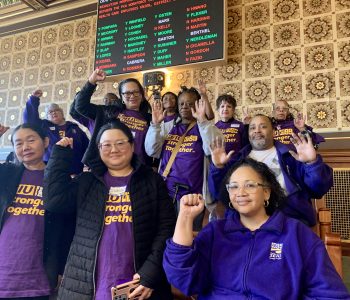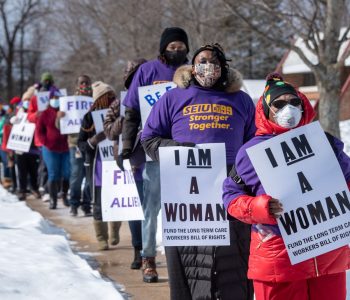 Press Releases
Press Releases
The State of Connecticut must provide adequate funding for public services to save lives. The COVID-19 pandemic and its side effects have magnified the importance of building a robust structure to address unprecedented need for services the Department of Mental Health and Addiction Services, the Department of Children and Families and the Department of Correction.
Today, the New England Health Care Employees Union, District 1199, SEIU, presented the ongoing campaign to demand public investments in mental health and addiction services, and demanding a moral budget that ensures quality services for Black, Brown, White and API communities.
TV ad in English:
TV ad in Spanish:
The Union also released letters recently sent to the DCF, DMHAS and DOC commissioners with specific concerns and priorities to achieve proper funding of services.
1199NE Letter to DCF Commissioner – March 29, 2021: https://bit.ly/39wkTNI
1199NE Letter to DMHAS Commissioner – March 29, 2021: https://bit.ly/3masozd
1199NE Letter to DOC Commissioner – March 29, 2021: https://bit.ly/3dnYIdV
Another letter sent to Representative Toni Walker and Senator Cathy Osten, co-chairs of the Appropriations Committee at the Connecticut General Assembly.
Community Letter to Approps Co-chairs – March 31, 2021: https://bit.ly/3rNEobf
Proper funding for these critical services in Connecticut creates wealth and wellness with equity in Black, Brown, White and API communities. Currently, more than 1,200 health care vacancies have yet to be filled while demand for services continues to grow.
State officials paid millions in taxpayers’ dollars to Boston Consulting Group to keep the same austerity that has failed us for decades. The state workforce has not been smaller in 60 years. Experts have shown that Connecticut needs more, not fewer public services.
Connecticut must pass a moral budget to build a better future for all communities. Passing a moral budget includes using the billions of dollars in funding from the federal government’s American Rescue Plan to expand critical services like the mobile crisis unit at key agencies such as DMHAS, DCF and DOC, and establishing revenue strategies that will protect these services from further deterioration in the long-run.
Video of Press Conference:
Quotes from today’s speakers:
“Over many years and especially the last ten, however, chronic underfunding has cut our services to the bone – leaving huge gaps in coverage on nights and weekends. As a result, mental health emergencies are often handled by the police—not trained mental health professionals like us.
We need to expand mobile crisis services now more than ever. The pandemic and the huge mental health crisis that it has created have exposed the cracks in our safety net—cracks that our members and our clients have known about for a long time. At Capitol Region, the number of calls we receive from the police has tripled since the start of the pandemic.”
Sonja Morton, LCSW
Capitol Region Mental Health Center (DMHAS)
“The National Association of Social Workers, CT Chapter, representing over 2,300 social workers, calls upon the Lamont Administration and the CT Legislature to expand and fully fund mental health services for DMHAS, DOC and DCF. This must include filling vacant positions as well as bringing on additional social workers. The Covid-19 pandemic is causing a dramatic increase in mental health needs in all age groups and amongst providers too. A recent Oxford University study found that 19% of persons who have Covid will receive a psychiatric diagnosis within 90 days. CT is facing a tsunami of mental health needs that will wash us away if we do not fully fund programs in this budget.”
Stephen Wanczyk-Karp, LMSW
Executive Director
National Association of Social Workers, CT Chapter
“I am legally disabled by PTSD. I have been an active member for 32 years at Prime Time House, which gives me a place to contribute to a community that accepts me. They too are understaffed and underfunded. I see that people like me need increased support just to stay out of the ER, the hospital, and prison. Preventing crises actually saves the state money and saves lives. An ounce of prevention is worth a pound of healing! Mental health services are needed more than ever now. Lives are being impacted. Please increase financial support.”
Willow Dealy
Torrington
Prime Time House
Contact: Pedro Zayas, pzayas@seiu1199ne.org, 860-830-2478







